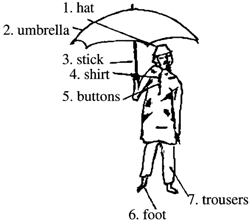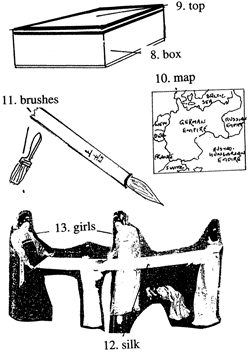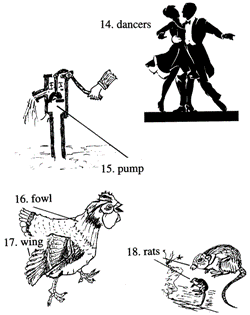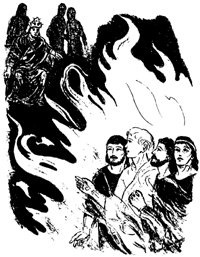Unit 30: Adverbs of Negation
Pictured Words
New Words

| 1. hat
|
| 2. umbrella
|
| 3. stick
|
| 4. shirt
|
| 5. buttons
|
| 6. foot
|
| 7. trousers
|

| 8. box
|
| 9. top
|
| 10. map
|
| 11. brushes
|
| 12. silk
|
| 13. girls
|

| 14. dancers
|
| 15. pump
|
| 16. fowl
|
| 17. wing
|
| 18. rats
|
Nouns
Sayings
Is there a map of the town?
There is not a map.
I will not let you see the silk shirt and trousers.
Not every one can go to the dance.
I will have some of that, thank you.
Give him not too much of that.
Not all silk is made in China, and not every insect is making silk.
Rats give us disease, but not much can be done about that.
Most fowls lay eggs, though not all do it every day.
Passports may be necessary but not to get into all colonies.
Not a little brush work will be needed for a good map.
Adverbs of Negation
There are some simple words that combine with verbs to show the direction of an action or its position in space.
These are the prepositions.
The two together may take the place of the many complex verbs of wider English.
Thus, you may say anything you may wish to say without having to get knowledge of the numerous complex verbs.
In addition, you may make clearer sense to your hearers because the language used in business and society is often limited.
There are also words that give further detail to the acts done by these verbs and prepositions.
They have the name: adverbs.
They give extra sense to the acts done by the verbs and prepositions.
We must now look at some of these adverbs.
They may be put into groups relating to when or how an act was done:
comparison between actions;
the negation of an act;
the degree of an action;
or the time it was done.
Not
You have seen that "Not" is a word that makes a statement negative, that is to say of the opposite sense.
"Not" is an adverb and is usually put next to the verb in a statement:
Death will not certainly come to you.
the tree which I said you were not to take.
do not let it be your master.
There are also a few qualities (adjectives) which are used with "not".
These are: every, all, little and much
Every
every good way.
Opposite: Not every good way.
every word of god is tested
Opposite: Not every word of god is tested.
every man is the special friend of him.
All
all the wonders which you have done.
Opposite: not all the wonders which you have done.
all the days of my life.
Opposite: not all the days of my life.
all my bones are out of place.
Opposite: not all my bones are out of place.
Little
Things which are little on the earth.
Opposite: things which are not little on the earth.
a little lower than the gods.
Opposite: not a little lower than the gods.
here a little, there a little.
Opposite: not a little here, not a litttle there.
Much
thirty times as much.
Opposite: not thirty times as much.
much property.
Opposite: not much property.
of much more value than they .
Opposite: of not much more value than they.

In The Flaming Fire
Answering Nebuchadnezzar the king they said, There is no need for us to give you an answer to this question.
If our God, whose servants we are, is able to keep us safe from the burning and flaming fire, and from your hands, O King, he will keep us safe.
But if not, be certain, O King, that we will not be the servants of your gods, or give worship to the image of gold which you have put up.
Then Nebuchadnezzar was full of wrath, and the form of his face was changed against Shadrach, Meschach, and Abed-nego: and he gave orders that the fire was to be heated up seven times more than it was generally heat
And he gave orders to certain strong men in his army to put cords on Shadrach, Meschach and Abed-nego and put them into the burning and flaming fire.
Then these men had cords put round them as they were, in their coats, their trousers, their hats, and their clothing, and were dropped into the burning and flaming fire.
And because the king's order was not to be put on one side, and the heat of the fire was so great, the men who took up Shadrach, Meschach and Abed-nego were burned to death by the flame of the fire.
And these three men, with the cords about them, went down into the burning and flaming fire.
Then King Nebuchadnezzar, full of fear and wonder, got up quickly, and said to his wise men, Did we not put three men in cords into the fire?
And they made answer and said to the king, True, O King.
He made answer and said, Look!
I see four men loose, walking in the middle of the fire, and they are not damaged;
and the form of the fourth is like a son of the gods.
Then Nebuchadnezzar came near the door of the burning and flaming fire: he made answer and said you servants of the Most High God come out and come here.
Then Shadrach, Meschach and Abed-nego came out of the fire.
Additional Reading
The great king Nebuchadnezzar was ruler over a country in Mesopotamia called Babylonia.
There are a great many records of his time that are parallel to those of our text.
We now have knowledge that he made an end of Jerusalem with the destruction of its wall and its places of religion.
He took many prisoners there.
Among them were the three men we get knowledge of here.
These three men were in great danger.
The king had great power, for his rule was over many nations and so it seemed a wise political act to set up an image of gold to give him respect.
All persons who did not give full respect to that image seemed to the king to be making a false act toward his authority.
That is why these men were to be killed in the fire.
As we see, that did not make them come to their end, rather to get respect from the king himself.
The king was not able to say anything against the God of these three men.
He seems to have been a man of reason for he had respect for their God.
The records from his time show that he was probably a man of religion himself.
We are told that he let himself think he was an ox and so he went into the fields and took grass for his food.
Such an act seems to us now to be that of a foolish man, but we may be making an error there.
In those days there was a strong belief in the god like qualities of the ox.
He may have thought of himself as so great that he was one of these god like animals.
The records say, "they will give you grass for your food like the oxen, and seven times will go by you, till you are certain that the Most High is the ruler in the kingdom of men, and gives it to any man at his pleasure
Under the rule of this great king, Babylon became a very beautiful place, one of great attraction to all the nations known at that time.
It is still thought to be an example of building skill, a jewel in the memory of all men.
In his own records this king said a great amount about his buildings but he said little about his wars.
It is said that he built the "hanging gardens of Babylon".
The central idea in his building works was to let their form and structure give attention to the greatness of the gods of his own nation.
So, we may see that this king not only had respect for the God of the three men in our story but that he also seems to have been so conscious of his own gods that he made his city a place of religion and of beauty
Helpful Notes
| worship the image
| pay respect to a structure in honor of the king.
|
| the form of his face
| his complete look.
|
| trousers
| a person's leg dress burned to death
| the heat made them die.
|
| a son of the gods
| more than man, a holy being.
|
| Babylonia
| its chief town (capital) was Babylon.
|
| man of reason
| with common sense.
|
| seven times will go
| a long time, seven was an important number.
|
| living forever
| never going to come to an end.
|
| jewel in the memory
| giving long lasting pleasure to think of.
|
Interesting Facts and Records
The Exodus
At a time of great development, when boxes and parcels of food came into Egypt by the cart load, there were over one million Hebrews in servitude.
The apparatus of state was laying heavily upon their bare backs.
They were working beneath the whip.
It was a time when the desire for freedom was strong but they dare not protest.
Just at that stage, Moses was born and was given the best the nation had.
As a chief among chiefs, he had a silver spoon in his mouth.
He was put through a careful program of arts, medicine and war.
This was to give him a passport to the role of ruler.
He learned painting with a brush, reading, writing and printing on pages of leaves.
But then it was learned that he was a Hebrew.
Hebrews were lower than rats in Egypt at that time.
Long before, a nation from Palestine had been the rulers of Egypt.
Now it seemed that there was a curtain separating the two nations.
Egypt was again under its own control.
The Hebrews had their backs bent and their muscles stretched in work for the Egyptians.
Moses had to get away from Egypt.
The training given Moses in his early years was not easily brushed aside.
His rate of adjustment to new ways was slowed, but his program of development continued.
For one thing, he did learn about the country to which he would take the Hebrews.
He had in his mind a map of the dry lands where freedom could be got.
So, when Moses came again to Egypt he alone was the one with the passport under God's guidance to a new colony in those dry places.
He took the people out to freedom.
The account is well known still.
But we do not readily see behind the action.
Firstly, there was a company of one million and a half persons.
They had a great many troubles, too.
But, they had got the gold, silver and clothes of Egypt.
The Egyptians had made a big error.
They used the Hebrew women in their houses, and killed the male babies.
So, when that great group left, the Hebrew women had taken away the Egyptian's goods.
They had every stitch of clothing shirts, silks, skirts and socks.
The gold and silver was hidden within it.
This was the supply from which so much gold was put into the ark of hard wood which now has the name, "The Ark of the Covenant".
The Egyptians had no idea of the way God would part the waters for the Hebrews.
But, He let them come back suddenly onto the Egyptians.
He sent them to a watery end beneath the waves.
The Hebrew women could dance among the dead bodies of the Egyptians from whom they had taken so much gold.
The most notable thing, however, is the support given by God to this vast company in those dry lands.
The sweet bread that was there each morning for fourty years was limitless.
The amount is beyond our conscious knowledge.
The agricultural produce of many farms would in no way be equal to it.
It gave food for 40 years.
Then, the fowls that came on the wind in the evening gave the company meat.
It is all beyond belief.